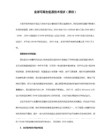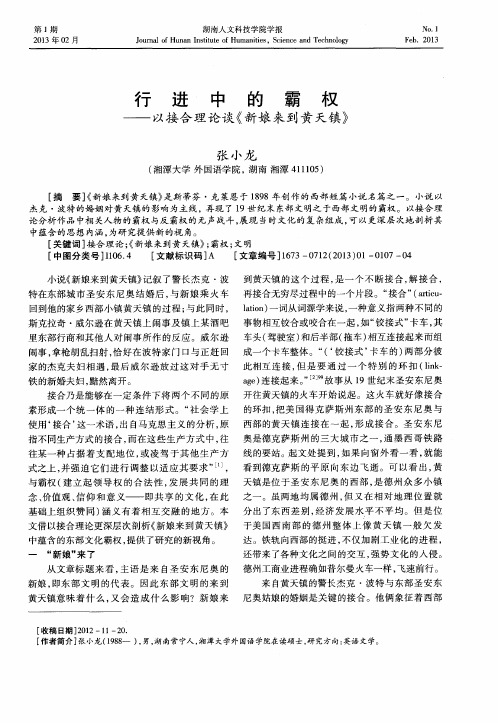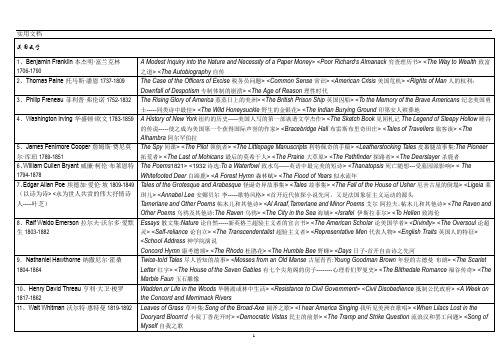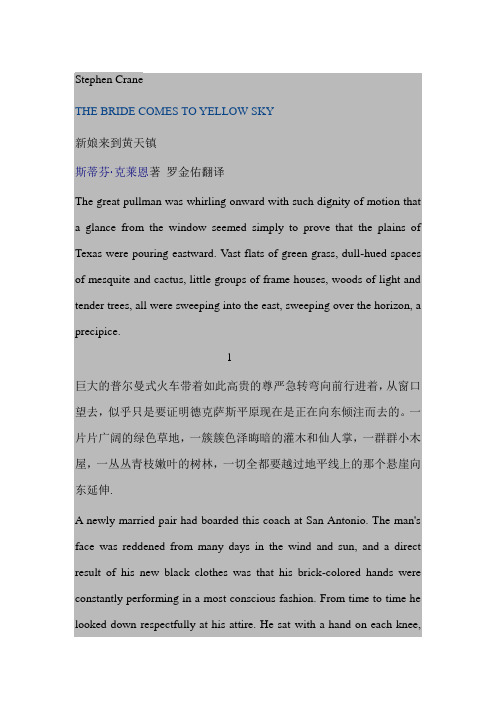《新娘来到黄天镇》小说论文
- 格式:docx
- 大小:19.97 KB
- 文档页数:13


文明的二重性:克莱恩短篇小说《新娘来到黄天镇》中文化冲突对人的影响作者简介:张力(1989.7-),女,四川外语学院研究生部2010级英语语言文学专业英语文学方向硕士研究生。
摘要:斯蒂芬·克莱恩(stephen crane,1871-1900)被誉为“美国自然主义的先驱”,善于描写生活在社会底层的人物,反映社会问题。
工业文明极大地推动西部发展进程;同时,人们的身心在东西部不同的文化影响下经历了巨变。
《新娘来到黄天镇》是克莱恩的关于西部的短篇小说,以一对新婚夫妇的返乡经历为主线,通过人物命运的改变揭示了工业文明影响下文化冲突给人带来的巨大影响。
本文旨在通过对该小说的解析,探索克莱恩在工业文明对美国西部的影响这一问题上的态度。
关键词:斯蒂芬·克莱恩;人;文化影响;《新娘来到黄天镇》中图分类号:i712 文献标识码:a 文章编号:1006-026x(2012)11-0000-01消逝的传统克莱恩有意识地打破了西部小说的传统。
《新娘来到黄天镇》开篇就描写一辆西行的普尔曼列车穿越德克萨斯平原的画面。
列车正如来自东部的先进新型工业文明,为荒芜广袤的传统西部带来希望。
在东部的支持下,西部既拓展了发展空间,又丰富了当地群众的生活。
在东部的引领下,古老的西部将焕然一新。
传统已然渐行渐远,如从视线里消逝的德克萨斯平原。
美国本土东西部文化的冲突对立在故事中有深刻体现。
黄天镇是一个典型的西部乡村小镇,而圣安东尼奥则成了现代都市的代表。
小说开篇画面中疾驰的火车正是工业文明的产物,它不仅促进了东西部人口的快速流动,加强了东西部贸易往来,还是东部工业文明的使者,给蛮荒的西部边疆带来了新的文明。
西部扩张不仅仅是地理意义和政治意义上的领土扩张,更是一种文化意义上的拓疆。
“野蛮”与“文明”发生了冲突,随着森林被砍伐、印第安人被杀戮和人性被侵蚀,西部农业乌托邦的梦想日趋幻灭。
真诚:克莱恩判定文化的标准在十九世纪晚期,边疆思想在美国人心中起着至关重要的作用。

英国文学上BeowulfThe Canterbury TalesThe Three RavensSir Patrick SpensRobin Hood and the Three Squires [skwaɪə]The Faerie Queene ['feɪərɪ]The Tragical History of Doctor FaustusRomeo and JulietThe Merchant of VeniceJulius CaesarHamletThe King James Bible of 1611Of Great PlaceOf StudiesSongThe Canonization [,kænənə'zeʃən]A Valediction:Forbidding Mourning[,vælɪ'dɪkʃən] VirtueSong to CeliaTo Mr. Cyriack Skinner Upon His Blindness Paradise LostThe Pilgrim’s Progress 贝奥武甫坎特伯雷故事集三只乌鸦帕特里克·斯本士爵士罗宾汉和三个乡绅仙后浮士德博士的悲剧罗密欧与朱丽叶威尼斯商人尤里乌斯·凯撒哈姆雷特钦定圣经谈高位谈读书歌封为圣者别离辞:节哀美德致西莉亚关于自己的失明致西莉雅克·斯凯纳失乐园天路历程An Essay of Dramatic PoesyMoll FlandersA Modest ProposalThe Royal ExchangeSir Roger at ChurchAn Essay on ManLetter to the Right Honourable The Earl of Chester fieldThe Preface to ShakespeareThe History of Tom Jones, A FoundlingThe Expedition of Humphry ClinkerElegy Written in a Country Churchyard['elɪdʒɪ] The School for ScandalIs There for Honest PovertyScots, Wha HaeAuld Lang SyneA Red, Red RoseFrom Songs of InnocenceThe LambHoly ThursdayFrom Songs of ExperienceThe Chimney SweeperThe TygerLondon 论戏剧诗摩尔·弗兰德斯一个谦卑的建议皇家交易所罗吉先生在教堂人论致吉斯特非尔德爵爷书《莎士比亚集》序弃儿汤姆·琼斯的故事汉弗莱·克林克出征记墓畔哀歌造谣学校穷得有志气苏格兰人拥有往昔时光我的爱人像朵红红的玫瑰天真之歌羔羊耶稣升天节经验之歌扫烟囱的孩子虎伦敦英国文学下Lyrical BalladsComposed upon Westerminster Bridge The Solitary ReaperI Wandered Lonely as a CloudTintern AbbeyKubla KhamThe Rime of the Ancient MarinerChilde Harold’s PilgrimageDon JuanWhen We Two PartedShe Walks in BeautySong to the Men of EnglandOde to the West WindOn First Looking into Chapman’s Homer Ode to a NightingaleTo AutumnOld ChinaOn the Knocking at the Gate in Macbeth IvanhoeDombey and SonBleak HouseVanity Fair 抒情歌谣集写于威斯敏斯特桥上孤独的割麦女我好似一片孤的流云丁登寺忽必烈汗古舟子咏恰尔德•哈罗尔德游记唐璜记当时我俩分手她身披美丽而行致英国人之歌西风颂初读查普曼译荷马史诗夜莺颂秋颂古旧的瓷器《论<麦克白>剧中的敲门声》艾文赫董贝父子荒凉山庄名利场Break, Break, BreakUlyssesIn MemoriamMy Last DuchessMeeting at NightParting at MorningDover BeachWuthering HeightsPast and PresentTess of the D’UrbervillesIn Time of “The Breaking of Nations”AfterwardsHeart of DarknessMajor BarbaraThe Love Song of J. Alfred Prufrock The Landscape near an Aerodrome Spain 1937Look Back in AngerWaiting for GodotA Severed HeadLord of the FliesIn a Free StateMoney: a Suicide Note 拍岸曲尤利西斯悼念我的前公爵夫人深夜幽会清晨离别多佛海滩呼啸山庄过去和现在德伯家的苔丝国家分裂时身后黑暗的心脏巴巴拉少校普鲁弗洛克的情歌机场附近的景色西班牙1937愤怒的回顾等待戈多割裂的头脑蝇王在一个自由的国度钱:绝命书Death of a NaturalistPunishmentPride and PrejudiceJane Eyre美国文学Poor Richard’s AlmanacThe AutobiographyTales of the Grotesque and Arabesque TalesThe Fall of the House of UsherThe Masque of the Red DeathLigeiaThe Black CatThe Cask of AmontilladoMurders in the Rue MorgueThe Purloined LetterThe Gold BugThe Philosophy of CompositionThe Poetic PrincipleNatureSelf-RelianceThe American ScholarThe Divinity School Address [dɪ'vɪnɪtɪ]博物学家之死惩罚傲慢与偏见简爱格言历书自传述异集故事集厄舍大厦的倒塌红色死亡假面舞会莉盖亚黑猫阿芒提拉多的酒桶莫格街谋杀案被窃的信件金甲虫创作哲学诗歌原理论自然论自助论美国学者神学院致辞Representative MenEssaysEnglish TraitsThe Conduct of LifePoemsMay-DayTwice-told TalesMosses from an Old Manse The Scarlet LetterThe House of the Seven Gables The Blithedale RomanceThe Marble FaunTypeeOmooMardiRedburnWhite JacketMoby DickThe Confidence ManBattle PiecesJohn Marr and other Sailors TimoleonBilly Budd 人类代表论文集英国特征人生的行为诗集五月节故事重述古宅青苔红字带有七个尖角阁的房子福谷传奇玉石雕像泰比欧穆玛地雷得本白外衣白鲸骗子的化装表演战事集约翰•玛尔和其他水手梯摩里昂毕利•伯德On the Duty of Civil DisobedienceWaldenA Week on the Concord and Merrimack River Voices of the NightBallads and Other PoemsEvangelineThe Song of Hiawatha [,haiə'wɔθə]I Shot an Arrow…A Psalm of LifeAnnabel LeeThe RavenSonnet-To ScienceTo HelenLeaves of GrassOne’s Self I SingO Captain! My Captain!To Make a Prairie…Success is Counted SweetestI’m Nobody!The Celebrated Jumping Frog of Calaveras County The Innocents AbroadThe Gilded AgeThe Adventures of Tom Sawyer 论公民的不服从沃尔登《在康科德与梅里马克河上一周》《夜吟》歌谣及其他伊凡杰林海华沙之歌我射出一支箭…生命颂安娜贝尔•李乌鸦十四行诗——致科学致海伦草叶集我歌唱自我噢,船长!我的船长!要描绘一片草原……最美妙的胜利感觉我是无名之辈卡拉维拉县驰名的跳蛙傻瓜出国记镀金时代汤姆索亚历险记Life on the MississippiThe Adventures of Huckleberry FinnA Connecticut Y ankee in King Arhur’s Court The Tragedy of Pudd’nhead WilsonThe Man That Corrupted HadleyburgA Passionate PilgrimThe AmericanThe Portrait of a LadyThe BostoniansThe Turn of the ScrewThe Wings of the DoveThe AmbassadorsThe Golden BowlThe Art of FictionDaisy MillerThe Awkward AgeThe Spoils of PoyntonThe Princess of CasamassimaThe Jolly CornerMaggie:A Girl of the StreetsThe Red Badge of CourageThe Open BoatThe Bride Comes to Yellow Sky 密西西比河上哈克贝里•费恩历险记亚瑟王朝廷上的康涅狄格洲美国佬《傻瓜威尔逊》败坏了哈德莱堡的人热衷游历的人一个美国人一个女士的画像波士顿人螺丝在拧紧鸽翼专使金碗小说的艺术黛西•密勒未成熟的少年时代波音敦的珍藏品卡萨玛西玛公主快乐的一角街头女郎麦姬红色英勇勋章海上扁舟新娘来到黄天镇The Blue HotelWindy Mcpherson’s Son Winesburg, OhioMarching MenPoor WhiteThe Triumph of the EggHorses and MenMany MarriagesDark LaughterBeyond DesireDeath in the WoodsThe Flowering JudasPale Horse, Pale RiderThe Leaning TowerThe Old OrderOld MortalityA Ship of FoolsThe Jilting of Granny Weatherall This Side of ParadiseThe Beauty and the Damned Flappers and Philosophers Tales of the Jazz AgeThe Great Gatsby 蓝色旅店饶舌的麦克佛逊的儿子俄亥俄州的温斯堡镇前进的人们穷白人鸡蛋的胜利马与人多种婚姻阴沉的笑声超越欲望林中之死开花的紫荆树灰色骑士灰色马斜塔旧秩序修墓老人愚人船被背弃的老祖母人间天堂漂亮的冤家姑娘们与哲学家们爵士乐时代的故事了不起的盖茨比Tender is the NightThe Crack-upSoldiers' PayMosquitoesThe Sound and the Fury ['fjʊərɪ] As I Lay DyingLight in AugustAbsalom, Absalom! ['æbsələm] SartorisThe HamletThe TownThe MansionBarn Burning [bɑːn]The Marble FaunGo Down, MosesThe Sun Also RisesA Farewell to ArmsThe Old Man and the SeaFor Whom the Bell TollsThe Garden of EdenIn Our TimeWinner Take NothingTo Have and Have Not 夜色温柔崩溃士兵的报酬蚊群喧哗与骚动我弥留之际八月之光押沙龙,押沙龙!沙多里斯村子小镇大宅烧牲口棚大理石牧神去吧,摩西太阳照常升起永别了,武器老人与海丧钟为谁而鸣伊甸园在我们的时代里胜利者一无所获有钱人与没钱人ExultationsPersondeCathayCantosIn a Station of the MetroAnecdote of the JarCollected Later PoemsCollected Early PoemsPatersonThe Red WheelbarrowA Boy’s WillNorth of BostonCollected PoemsA Further RangeA Witness TreeNew HamphshireFire and IceStopping by Woods on a Snowy Evening The Road Not TakenThe Dream KeeperShakespeare in HarlemFine Clothes to the JewThe Weary Blues 狂喜人物中国诗章在一个地铁车站坛子的轶事近期诗集早期诗集佩特森红色手推车一个男孩的意愿波士顿的北部诗集又一片牧场标记树新罕布什尔火与冰雪夜林边驻脚未选择的路梦乡人哈莱姆的莎士比亚抵押给犹太人的好衣服萎靡的布鲁斯Me and the MuleBorder LineThe Poet of EarthThe Happy Marriage ConquistadorArs PoeticaIn the ZoneThe Long Voyage Home Bound East for CardiffThe Moon of the Caribees Emperor JonesThe Hairy ApeDesire under the Elms Mourning Becomes Electra Strange InterludeThe Iceman ComethThe Great God BrownA Touch of the PoetLong Day’s Journey into Night More Stately MansionsThe Moon for the Misbegotten HughieOne Man’s Meat 我与骡子分界线大地诗人幸福的婚姻征服者诗艺在这一带漫长的返航东航加的夫加勒比的月亮琼斯皇帝毛猿榆树下的欲望悲悼奇异的插曲送冰的人来了大神布朗诗人的气质长日终入夜更庄严的大厦月照不幸人休依一个人的见解The Points of My Compass Stuart LittleCharlotte’s WebThe Glass MenagerieCat on a Hot Tin Roof Summer and SmokeThe Rose TattooA Streetcar Named Desire Invisible ManShadow and ActGoing to the Territory Life StudiesThe DolphinNorth and SouthIn the Waiting RoomThe WakingHowlBook of the DuchessThe Parliament of Fowles The ColossusArielWinter TreesThe Bell Jar 我罗盘上的方位斯图亚特•利特尔夏洛特的网玻璃动物园热铁皮屋顶上的猫夏日烟云玫瑰纹身欲望号街车看不见的人影子与行动走向领域人生的写照海豚北方与南方候诊室里苏醒嚎叫公爵夫人之书百鸟议会巨人小精灵冬天的树钟状的罐子Point ShirleyStill I RiseAll My SonsDeath of a SalesmanThe CrucibleA View from the BridgeAfter the FallThe Archbishop’s CeilingThe MisfitsDangling ManThe Adventure of Augie March Seize the DayThe VictimCatch-22Something HappenedWe Bombed In New Haven Song of SolomonJazzBelovedThe Bluest EyeLove MedicineTracksShadow Tag 雪莉角我仍将奋起全是我的儿子推销员之死炼狱桥头眺望堕落之后大主教的天花板不合时宜的人晃来晃去的人奥吉·玛琪历险记只争朝夕受害者第二十二条军规出了毛病我们轰炸了纽黑文所罗门之歌爵士乐宠儿最蓝的眼睛爱药痕迹影子标签The Antelope Wife The Beet Queen The Bingo Place The Plague of Doves 羚羊妻甜菜女王宾果宫鸽灾。



Stephen CraneTHE BRIDE COMES TO YELLOW SKY新娘来到黄天镇斯蒂芬·克莱恩著罗金佑翻译The great pullman was whirling onward with such dignity of motion that a glance from the window seemed simply to prove that the plains of Texas were pouring eastward. Vast flats of green grass, dull-hued spaces of mesquite and cactus, little groups of frame houses, woods of light and tender trees, all were sweeping into the east, sweeping over the horizon, a precipice.1巨大的普尔曼式火车带着如此高贵的尊严急转弯向前行进着,从窗口望去,似乎只是要证明德克萨斯平原现在是正在向东倾注而去的。
一片片广阔的绿色草地,一簇簇色泽晦暗的灌木和仙人掌,一群群小木屋,一丛丛青枝嫩叶的树林,一切全都要越过地平线上的那个悬崖向东延伸.A newly married pair had boarded this coach at San Antonio. The man's face was reddened from many days in the wind and sun, and a direct result of his new black clothes was that his brick-colored hands were constantly performing in a most conscious fashion. From time to time he looked down respectfully at his attire. He sat with a hand on each knee,like a man waiting in a barber's shop. The glances he devoted to other passengers were furtive and shy.一对新婚夫妇在圣安东尼奥登上了这列火车。
第一部分殖民主义时期the colonial period1.Hard work, thrift, piety and sobriety were the Puritan values that dominated much of the earliest Americanwriting.代表人物: cotton mather 科顿.马瑟Jonathan Edwards 乔纳森.爱德华兹Anne brandstreet 安妮.布雷斯特里特殖民时期第一位诗人,《最近在北美出现的第十位缪斯》第二部分理性和革命时期文学reasoning and revolution1、Benjamin Franklin 本杰明.弗兰克林代表作:Poor Richard’s Almanac穷人理查德的年鉴annual collection of proverbs 流行谚语集Autobiography 自传 18世纪美国唯一流传至今的自传2、Thomas Paine 托马斯.潘恩Rights of man 人的权利The age of reason 理性时代American Crisis《美国危机》, signed “Common Sense”.署名为“常识”3、Philip Freneau 菲利浦.弗瑞诺the most outstanding writer of the post-Revolutionary period(18th century). 是革命战争后期(18世纪)最杰出的作家。
the “Father of American Poetry”美国诗歌之父poet of American revolution4、Thomas Jefferson 托马斯.杰弗逊drafted the Declaration of Independence. 起草了独立宣言第三部分浪漫主义文学/Romanticismtranscendentalism超验主义:1、Ralf Waldo Emerson拉尔夫·沃尔多·爱默生be responsible for bringing Transcendentalism to New England, 是把超验主义引入新英格兰的先驱。
The Bride Comes To Yellow Sky Question1:1. How does the author employ the stereotypes of the western fict ion?The author employs the stereotypes of the western fiction is suspense in the Bride Comes to Yellow Sky.At the beginning of the story, the author sets a big suspense “Where is the train going to?” for the readers. And then the characters of the story come up who are a newly couple, the bride and the groom, Jack Potter .So another suspense is provided for the readers which is “Who are they? And why do they take the train?” Gradually, with the development of the story’s plot, when the readers just understand the previous suspense, they know what happened to the newly couple. However, the new suspense shows up which is “What do the groom’s hometown people react about the bride?”At the same time, in the groom’s hometown, a drunkard, Scratchy Wilson, the enemy of the groom, showed up. The author uses a lot of words to describe Scratchy Wilson. The suspense comes up in readers’mind that is “Why does the author shape the drunkard? And what will happen between the drunkard and the newly couple when the newly couple arrive Yellow Sky”, so the readers are eager to read the all passage to find out the facts. In the last part, the author through the talk between the groom and the drunkard present toreaders all the reasons and the all suspense is solved. Suddenly, the readers feel relaxed because it seems all the things are so.In the conclusion, the author uses suspense way making the fiction more attractive and successfully gives the deepest impression on readers. Anyway, the author uses the suspense method very effective in the Bride Comes to The Yellow Sky.Question2:Talk about the five stages of the plot of the story?1. Exposition•Background information•Potential conflict•Characters2. Complication•While the newly married pair are on the way to Yellow Sky, the bar in the town , was no more peace, as the news of Wilson’s coming.People are nervous and scared.town was became a toy for him actually.The man even go to Jake’s house to bellow for the duel.3.Crisis•As aforementioned, Scratchy was very anger, he put churninghimself to deepest rage over the immobility of potter’s house, and waiting for a fight. When Potter and his wife encounter Scratchy, it seems that they would had a terrible war, but Potter said that he hasn’t got a gun, so the story make a turning point.4. Falling actionWhen heard the news of Potter’s marriage, Sc ratchy was not at all comprehending, he become another period of silence, his mood was very complex, he decide to let things gone.5. ResolutionScratchy picked his starboard revolver and placing both weapons in their holsters, and then went away. No enmities, but relieved.Question3:What is the function in the story of the traveling salesman? of the bride? of the dog?The traveling salesmanThese man calm and logos represented the developed indorse and the civilization. He is very surprised that still exist the man who likes Scratchy. As the new coming of the drummer, he reflect the culture conflict, in the story, the changing of the character’s living spaceannounce the heart conflict and the clash of the west and east in America.The brideThe bride in the story is the representative of the Industrial civilization, and the hero is the representative of the Agricultural civilization, he went against the customs of his country and married the east woman, this is the marriage of east and west, is also the marriage of culture. At the same time, the bride is a paradox; she came from east but bottom, so she is shy and timid.The dogThere is a whole paragraph to describe Wilson tweak dog when he was drunk. We can find that author change their character to sarcasm the human, and overflow the naturalism. And then use these form to contrast the inhumanity of Wilson.In conclusion, the dog is used to conflict with the setting and the humanity.。
邢台学院外语系2010—2011学年第二学期期末论文论文题目:The narrative method and shift of points of view of The Bride Comes to Yellow Sky课程名称:《英美小说要素解析》任课教师:张淑菊学生姓名:殷红霞班级:08外本一学号:2008041128AbstractAs we all know, Crane Stephen is famous for his distinctive writing style and using shift of points of view. His work The Bride Comes to Yellow Sky is a typical representative of his unique writing features.Key WordsNarrative method;shift of points of view;parallel linear narrative structure;mingling points of view;third-person points of viewThe narrative method and shift of pints of view of The Bride Comes to Yellow SkyCrane Stephen, American author whose short story was remarkable and among them, The Bride Comes to Yellow Sky is one of his best short stories was drawn as a journalist of New York World during the Western American War in 1898.Ⅰ. Crane’s distinctive writing featuresAs we all know, Crane Stephen is famous for his distinctive writing style and using shift of points of view. His work The Bride Comes to Yellow Sky is a typical representative of his unique writing features.Crane is the one that holds fancies of romantic knight romance and he has strong passion in his life. From his most works, he as a narrator can’t stop jumping into the story to illustrate some words now and then and that sincere feeling makes an effect on readers.Ⅱ. Parallel linear writing structure in The Bride Comes to Yellow SkyThe Bride Comes to Yellow Sky’s writing structure is distinctive. And it is filled with parallel linear writing structure.The Bride Comes to Yellow Sky narrates a story about Jack Potter returning his town----Texas with his bride. In this story, Crane adopts nonlinear parallel the narrative structure----through two parallel lines that one is the scene that the happy new couple come back to home from the train station and the other one is the scene that drunken bully comes to Potter’s home for revenging, then these two lines interest----the couple and Wilson (the bully) confront with each other, which is narrated standing readers’ points.The story happens from lunch time to the time of arriving at the station to go home. One clue is that the new couple have lunch, see the scenery and talk in the chamber then arrive at the station, go back to home and the other clue is that at the same time, a bully, then news of drunken Wilson rushing into the town interrupts people’s everyday life in the bar, the bar closing the door, the guests escaping, Wilsonmaking trouble and retaliating to Potter’s home. The climax is that these above two clues intersect----the couple and Wilson run across at the corner suddenly. Time as the line of this story, the atmosphere changes from happiness to strain, the speed transits from slowness to rapidity. However, the story happens at the same time but not in the same space----the couple that they are on their way home, the people that live their life in the town, especially Wilson who is an importing point connecting the town with the couple and the role of Wilson develops the plot of this story leading to the climax of the story.Ⅲ. Shift of points of view in The Bride Comes to Yellow SkyIn addition to, his parallel linear narrative structure is through the whole story, and Crane makes best use of shift of points of view.The Bride Comes to Yellow Sky’s narrative point of view is distinctive and unique. It integrates third-person point of view and mingling points of view. There are three variants: omniscient, limited omniscient, and objective or dramatic.Authors may at times feel the need for greater scope than first-person point of view affords. They wish to be the all-knowing narrator, not limited by time, place, or character, but free to roam and comment at will. Such a point of view is called third-person omniscient. The narrator, evidently the author, sees all, knows all, and presumably, tells all. In this collection, Stephen Crane’s The Bride Comes to Yellow Sky illustrates third-person omniscient point of view.While the omniscient point of view might seem at first glance the most flexible and functional, the author who adopts it pays a price. The reader may very well feel remote from the action. Certainly the reader will not as easily identify with the protagonist. The author who does not wish to sacrifice omniscience but who still hopes for greater reader identification with the protagonist may elect to tell the story from the limited-omniscient point of view. Although continuing to write in the third person, the author limits himself or herself to what is known by one character. Stephen Crane also uses the limited-omniscient point of view with notable success in The Bride Comes to Yellow Sky.Besides third-person, mingling points of view is penetrated all over the story. The writer may tell most of the story in one type of point of view but then shift at an important point for the purpose of sustaining interest or creating suspense. Stephen Crane’s The Bride Comes to Yellow Sky n arrates from Potter’s view, reader’s view, the dog’s view, Wilson’s view at last returns to reader’s view so that the readers know this entire story thoroughly.The Bride Comes to Yellow Sky integrates third-person omniscient point of view and limited omniscient point of view, and there is no lack of the tone of irony and sarcasm in the objective narration. Narrator tells us that the closer the train approaches to Yellow Sky, the more impatient the husband is with third-person point of view, and sometimes excited, sometimes inattentive, these two contradictory sentiments are fie rcely fighting in his mind. That we clearly see the care of bride’s to the husband is based on non-awareness to anxiety is from the eye of Potter’s. When the new couple are threatened by the revolver, the bride’s face had gone as yellow as old cloth, which readers get from standing at Wilson’s back. However, that Wilson’s ludicrous performance in the street is sneaked by the people who hide behind the bar’s closed door. Different sights from different eyes show the different variety of human’s life space.What is the most wonderful changes of point of view is between the dog and the drunken man in front of the bar. People are frightened to close the door and hide behind the door, to the contrast, a dog yet lazy dozing in front of his master’s door. At sight of the dog, the man paused and raised his revolver humorously, and at the sight of the man, the dog sprang up and walked diagonally away, with a sullen head, and growling, which is pretty ridiculous. Then, this scene that the man and the dog run after with each other is as wonderful as the modern shot. In fact in here, the dog’s sight is also the same as Wilson’s sight, that is to say, their sights are also narrator’s , the people’s behind the door, and our readers’. The people in the bar are scared to hide themselves, but maybe the dog is accustomed to these farces, for which, the dog doesn’t walk away until Wilson comes to the dog’s face, even the dog is unwilling to pay attention to him. The dog’s unreasonable behavior just as a beast trapped roars,howe ver, Wilson’s laughter depends on his weapon hanging on his hip. Here, the dog’s and the man’s roles are exchanged.Mingling point of view just like a camera is always changing so it composes a movable picture filled with suspense, strained and lax, slow and fast. But in the end, the frozen scene like the modern shot pulled----Wilson picked up his starboard revolver, and placing both weapons in their holsters, then went away. His feet made funnel—shaped tracks in the heavy sand, and the drunken man’s stagge r is embodied by the funnel-shaped tracks into our eyes.Though The Bride Comes to Yellow Sky was published a hundred years ago, there is no doubt that its narrative method has obvious modern film’s features. The shift of time and space, mingling point of view and visual and audible narrative shows the author’s distinctive writing style. Maybe due to these narrative features, Crane’s another novel Blue Hotel published was revised in to the film. We imagine that if Crane had live more long time, a lot of permanent works would have been created, which were immortal works in American literal history even in the world’s literal history.BibliographyLin Liuchen, An Approach to Fiction .Shanghai Foreign Language Teaching Press Shanghai, 2004W.C 布斯.华明.胡晓.苏周宪, 小说修辞学,,北京大学出版社,1987戈得罗.若斯特著.刘云舟译,,什么是电影叙事学,北京:商务印书馆,2005拉泽尔·齐夫著.夏平.嘉彤.董翔晓译,一八九O年代的美国,上海外语教研出版社,1988王先需,王文平. 文学理论批评术语汇释,高等教育出版社,2006。